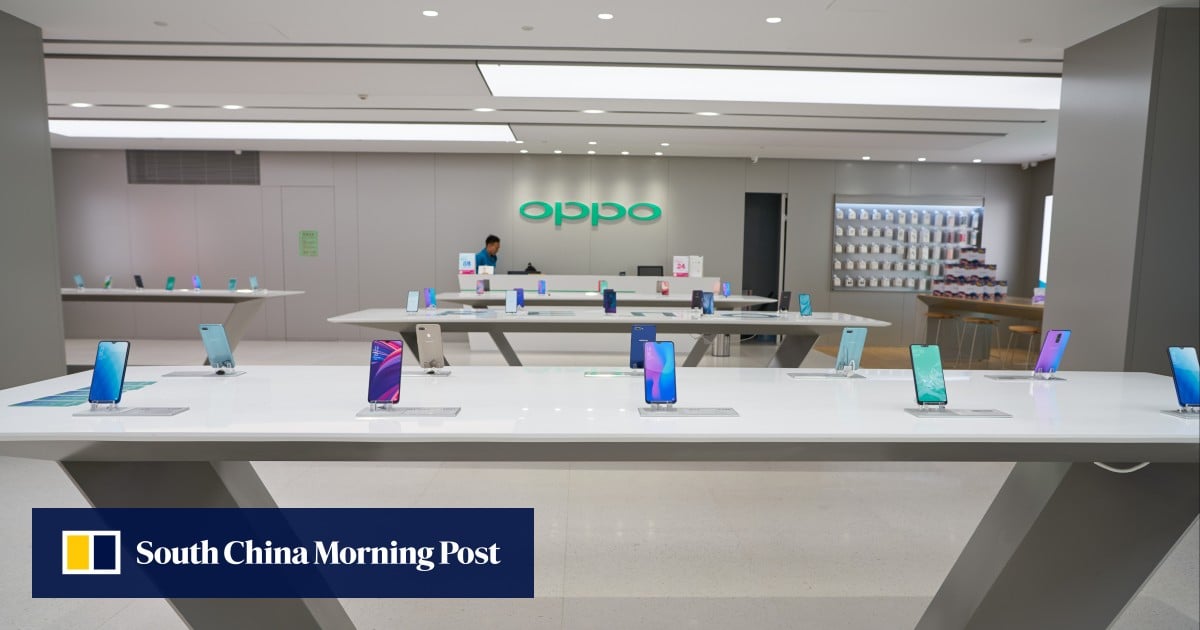Oppo, the fourth largest smartphone brand in the world, announced the move in a short statement on Friday after giving employees less than a day’s notice As China pushes for chip self-sufficiency, fabless firms are finding it difficult to sign on manufacturers of their designs amid US export restrictions

An Oppo shop at the China International Consumer Electronics Exchange/Exhibition Centre (CEEC) in Shenzhen seen in April 2019. Photo: Shutterstock
Chinese smartphone maker Oppo has abruptly closed down its chip design subsidiary, Zeku, to the shock of employees, according to the company and former workers, in a new cautionary tale for Chinese businesses pursuing the government’s drive for semiconductor self-sufficiency.
Oppo announced the move on Friday with a brief statement, blaming “uncertainties in the global economy and smartphone market” and calling it a “difficult decision”.
The news came as a surprise to Zeku employees, who received less than a day’s notice. One employee, who declined to be named, told the South China Morning Post that workers were told on Thursday not to go into the office the next day. “I can’t even go back to the office to get the laptop,” the employee said.

 www.scmp.com
www.scmp.com
Oppo gives up on building custom chips for its flagship phones
Bloomberg reports Oppo’s Zeku division was set up in 2019 and carried about 200 patents in its Shanghai division. Like Apple, Oppo started making its own co-processors for imaging and other smartphone components but had not successfully launched its own SoC to get away from relying on other companies for the most significant chip in the device.
Oppo’s most recent releases include the Oppo Find N2 Flip, which is powered by a MediaTek Dimensity 9000 Plus chip, while its Find X6 Pro uses Qualcomm’s Snapdragon 8 Gen 2.
Last year, the US issued sweeping restrictions on chip sales to China and other countries in the wake of the war in Ukraine. Chinese phone manufacturers, including Oppo, would have to get licenses to use chips built by US-based companies.
In January, media reports indicated the US cut a deal with the Netherlands and Japan to further restrict exports of chip manufacturing technology. The move could cut off Chinese companies from suppliers like ASML — the world’s only producer of lithography machines needed to develop newer chips.
Oppo is a sister company to OnePlus, and the two smartphone manufacturers share many of the same components. Switching to a customized in-house chip, like rivals Apple and Google with their A-Series and Tensor chips, could have expanded the capabilities of future devices from both companies.

 www.theverge.com
www.theverge.com

An Oppo shop at the China International Consumer Electronics Exchange/Exhibition Centre (CEEC) in Shenzhen seen in April 2019. Photo: Shutterstock
Chinese smartphone maker Oppo has abruptly closed down its chip design subsidiary, Zeku, to the shock of employees, according to the company and former workers, in a new cautionary tale for Chinese businesses pursuing the government’s drive for semiconductor self-sufficiency.
Oppo announced the move on Friday with a brief statement, blaming “uncertainties in the global economy and smartphone market” and calling it a “difficult decision”.
The news came as a surprise to Zeku employees, who received less than a day’s notice. One employee, who declined to be named, told the South China Morning Post that workers were told on Thursday not to go into the office the next day. “I can’t even go back to the office to get the laptop,” the employee said.

Chinese smartphone brand Oppo shutters chip design unit amid sufficiency drive
Oppo, the fourth largest smartphone brand in the world, announced the move in a short statement on Friday after giving employees less than a day’s notice.
Oppo gives up on building custom chips for its flagship phones
Bloomberg reports Oppo’s Zeku division was set up in 2019 and carried about 200 patents in its Shanghai division. Like Apple, Oppo started making its own co-processors for imaging and other smartphone components but had not successfully launched its own SoC to get away from relying on other companies for the most significant chip in the device.
Oppo’s most recent releases include the Oppo Find N2 Flip, which is powered by a MediaTek Dimensity 9000 Plus chip, while its Find X6 Pro uses Qualcomm’s Snapdragon 8 Gen 2.
Last year, the US issued sweeping restrictions on chip sales to China and other countries in the wake of the war in Ukraine. Chinese phone manufacturers, including Oppo, would have to get licenses to use chips built by US-based companies.
In January, media reports indicated the US cut a deal with the Netherlands and Japan to further restrict exports of chip manufacturing technology. The move could cut off Chinese companies from suppliers like ASML — the world’s only producer of lithography machines needed to develop newer chips.
Oppo is a sister company to OnePlus, and the two smartphone manufacturers share many of the same components. Switching to a customized in-house chip, like rivals Apple and Google with their A-Series and Tensor chips, could have expanded the capabilities of future devices from both companies.

Oppo gives up on building custom chips for its flagship phones
Shrinking smartphone sales and China export bans made things more difficult.


